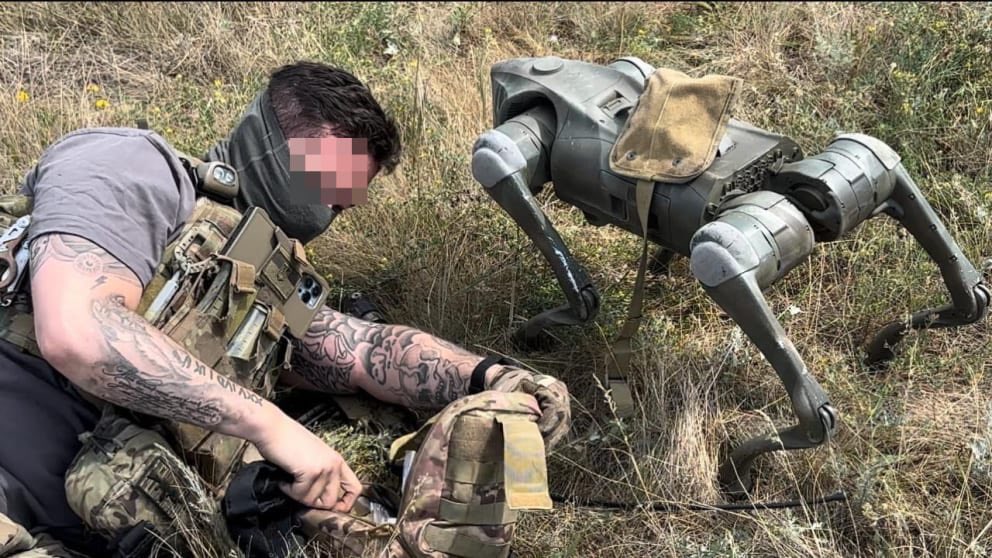The Armed Forces of Ukraine (AFU) have started using BAD.2 model robot dogs created by the British firm Brit Alliance, according to a report by Bild, Germany’s prominent media outlet.
These advanced robotic units are proving to be a significant asset in Ukraine’s military strategy, presenting a new challenge for the Russian forces.
The BAD.2 robot dogs are compact ground drones fitted with high-definition video cameras specifically designed for reconnaissance operations. They can carry out detailed surveillance without putting human lives at unnecessary risk.
Capable of speeds up to 15 km/h, these devices can navigate through trenches, wooded areas, and other difficult terrain that traditional unmanned aerial vehicles (UAVs) might struggle to access.
F-16s “Sitting Ducks” For Russian MiG-31 Fighters? Putin Warns Of Consequences Over Fighting Falcons
Their agility and versatility make them invaluable for gathering intelligence in areas that are otherwise hazardous for soldiers. Their ability to maneuver through dense undergrowth and concealed positions makes them ideal for gathering critical information from areas that are difficult for drones or soldiers to reach.

The report said that more than 30 of these robot dogs are currently in use by Ukrainian forces. Each unit, depending on its modification, costs between €4,000 and €8,000.
To evade possible detection by Russian forces, the Ukrainian military has equipped these robots with German-made anti-thermal camouflage, improving their stealth effectiveness.
Their ability to maneuver through dense undergrowth and concealed positions makes them ideal for gathering critical information from areas that are difficult for drones or soldiers to reach.
When US Lost F-22 & F-35 In Mere 4 Days & Averted A Mid-Air Collision Saving 2 More Stealth Fighters
This innovative use of technology is contributing to a shift in tactical operations on the ground, with the robot dogs becoming an effective tool in the Ukrainian arsenal.
The use of these robotic units not only boosts the AFU’s reconnaissance abilities but also signifies a significant leap in military technology within real combat situations. This development challenges traditional tactics and introduces new dynamics to the conflict.
However, the Bild report does not reveal whether more robot dogs will be deployed in the coming months.
Ukraine Unleashes Robot Dogs
This is not Ukraine’s first experience with robotic dogs in its military operations. Back in June 2022, the US Army announced it would supply Kyiv with two robotic dogs designed to assist in clearing minefields and managing other types of ordnance.
These robotic canines were as effective as their live counterparts for detecting landmines, and they were also unaffected by distractions.
Fast-forward two years: Ukrainian soldiers from the 28th, a separate mechanized brigade, have begun sharing their findings from field tests of a robotic dog used in combat settings through Telegram.
During a demonstration in a secret location within Ukraine, the robotic dog, identified as model “BAD One,” performed a range of movements, including standing, crouching, running, and jumping based on commands from its operator.
The robot’s stealth and agility suggest it could soon become a valuable asset on the front lines, especially given the Ukrainian army’s current shortage of personnel to defend against the Russian invasion.
Ukrainian fighters use a robot dog in the Toretsk direction for reconnaissance and demining assistance. pic.twitter.com/BfdoRVSFuR
— Victory For Ukraine 🇺🇦 (@UA_news_feed) August 3, 2024
Designed to be low to the ground and thus hard to detect, these robotic dogs can utilize thermal imaging technology to examine enemy trenches and interiors of buildings within conflict zones. This capability is particularly useful for reconnaissance missions.
The operator, who chose to be identified as “Yuri,” highlighted the advantages of the robotic dog to AFP journalists. He explained that while reconnaissance soldiers are typically highly trained and experienced, they face considerable risks.
The robotic dog mitigates these risks and enhances operational efficiency by reducing the exposure of human soldiers. The model showcased during the demonstration has a battery life of approximately two hours.
It is equipped not only for detecting mines but also for improvised explosive devices but also for transporting up to seven kilograms (15 pounds) of ammunition or medical supplies to critical locations on the battlefield.
However, the more advanced version of the robot, referred to as as “BAD Two,” was not demonstrated due to security concerns.
Yuri mentioned that while he could not specify the number of robotic dogs deployed in Ukraine, their impact is expected to be significant in enhancing operational effectiveness and improving soldier safety.
Similarly, Kyle Thorburn, head of Brit Alliance, stated that the deployment of robotic dogs enhances the effectiveness of combat operations and boosts the army’s morale.
Additionally, if the robotic dogs were ever captured by Russian forces, an emergency feature would allow the operator to delete all data to prevent any sensitive information from being compromised.
- Contact the author at ashishmichel(at)gmail.com
- Follow EurAsian Times on Google News